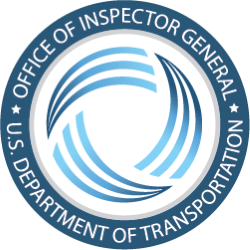
United States
- Contract and Grant Fraud (view a description of Common Fraud Schemes)
- Environmental, Health, and Safety Violations
- Computer Crimes
- Product Substitution and Suspect/Counterfeit Parts
- Bribery, Kickbacks, and Gratuities
- False Statements and False Claims
- Conflicts of Interest and Ethics Violations
- Travel Fraud
- Theft or Abuse of Government Property
- Violation(s) of Criminal Law and/or the Civil False Claims Act in Connection with a Federal Contract
- Other Violations of Federal Laws and Regulations
- DOT Employees
- Employees of DOT Contractors, Subcontractors, Grantees, and Sub-grantees
Leader of nationwide moving company scam conspiracy sentenced to 72 months in prison
DOT’s Fiscal Year 2023 Top Management Challenges
What We Looked AtAs required by law, we report annually on the Department of Transportation’s (DOT) most significant challenges to meeting its mission. We considered several criteria in identifying DOT’s top management challenges for fiscal year 2023, including their impact on safety, documented...
Quality Control Review of the Independent Auditor’s Report on the National Transportation Safety Board’s Audited Financial Statements for Fiscal Years 2022 and 2021
What We Looked AtWe contracted with the independent public accounting firm Allmond & Company, LLC (Allmond), to audit the National Transportation Safety Board’s (NTSB) financial statements as of and for the fiscal year ended September 30, 2022; provide an opinion on those financial statements; and...
Quality Control Review of the Independent Auditor’s Report on the Federal Aviation Administration’s Audited Consolidated Financial Statements for Fiscal Years 2022 and 2021
What We Looked AtWe contracted with the independent public accounting firm KPMG, LLP to audit the Federal Aviation Administration’s (FAA) consolidated financial statements as of and for the fiscal years ended September 30, 2022, and September 30, 2021. KPMG was required to provide an opinion on...
Quality Control Review of the Independent Auditor’s Report on the Surface Transportation Board’s Audited Financial Statements for Fiscal Years 2022 and 2021
What We Looked AtWe contracted with the independent public accounting firm Allmond & Company, LLC (Allmond), to audit the Surface Transportation Board’s (STB) financial statements as of and for the fiscal years ended September 30, 2022, and September 30, 2021; provide an opinion on those financial...
Independent Auditor’s Report on the Great Lakes St. Lawrence Seaway Development Corporation’s Financial Statements for Fiscal Years 2022 and 2021
What We Looked AtIn accordance with the Government Corporation Control Act of 1945, we audited the financial statements of the Great Lakes St. Lawrence Seaway Development Corporation (GLS), a U.S. Government Corporation, as of and for the fiscal years ended September 30, 2022, and September 30, 2021...
Quality Control Review on the Independent Auditors' Report on the Department of Transportation's Audited Consolidated Financial Statements for Fiscal Years 2022 and 2021
What We Looked AtWe contracted with the independent public accounting firm KPMG LLP to audit the Department of Transportation's (DOT) consolidated financial statements as of and for the fiscal years ended September 30, 2022, and September 30, 2021. KPMG was required to provide an opinion on those...
Airline passenger with box cutter who caused flight to be diverted has been indicted
Semiannual Report to Congress: April 1, 2022 - September 30, 2022
As required by the Inspector General Act of 1978 (as amended), this Semiannual Report summarizes the activities of the Department of Transportation Office of Inspector General for the preceding 6-month period.

